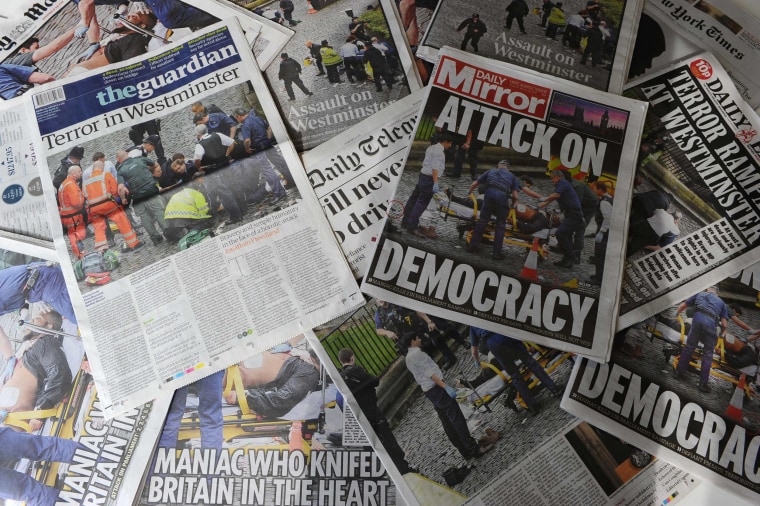LONDON — The near-blanket coverage of the car-and-knife attack on the British Parliament has triggered questions about whether the vast amount of reporting actually helps the terrorists' cause.
In “sensationalizing and dramatizing a crime" committed by a possibly deranged person, the British media had become “a megaphone for the act,” said Simon Jenkins, a former editor of The Times of London.
“No one is supposing we shouldn’t cover this outrage but editors have a decision about how much prominence you give it and it’s grossly disproportionate," he told NBC News.

The London attacker Khalid Masood — born Adrian Russell Ajao — killed an American tourist, a police officer and two others outside of the Houses of Parliament on Wednesday. Police said on Friday they were looking into how he was radicalized.
By covering the crime “as if 9/11 has come to London is ridiculous,” Jenkins said, adding that the media had essentially become "an accomplice” of terrorists by giving them the publicity.
“We’re essentially giving inspiration for other people to do exactly the same,” he added.
Journalists in France have begun taking a dramatically different approach to similar incidents. Last year, several French media outlets stopped publishing the names and photos of people responsible for terrorist attacks.
Following attacks in July last year — one when a man drove a truck into crowds celebrating the public holiday and the other a murder of an elderly priest in a church near Rouen — several French media outlets decided to stop publishing photos of the perpetrators of the killings.
In an editorial explaining its decision not to publish assailants' photos, Le Monde newspaper said it wanted to “avoid the possibility of posthumous glorification.”
It argued all elements of society had to be involved in combating terrorism and that the media had an important role to play. “Sites and newspapers could not excuse themselves from self-examination on several fronts,” it said.
Jenkins praised the decision to stop publishing images of terrorists and in the case of Europe 1 radio, to not broadcast their names.
He said it was a “very sensible thing to do and I applaud them for it," and added that British outlets should consider doing the same.
Roy Greenslade, former editor of the Daily Mirror and a professor of journalism, disagreed that media outlets should stop publishing photos and names of assailants, but seconded that the "the wall-to-wall" coverage of the London attack had been “over the top” and aids ISIS.
"The point of terrorists is to create terror," he said. "That is the definition of terrorism."
When the British press give undue publicity to a supposed act of terrorism, it helps play into the hands of those who seek to intimate.
"ISIS do nothing and yet they reap the rewards of being able to bring terror to a capital on the other side of the world," he said.
Greenslade said it was important to publish names and photos because it helps the authorities to gather information on assailants, adding that he didn’t think the French decision was comparable.
“I’m not saying we shouldn’t cover it, but we didn’t get it in proportion," he added.